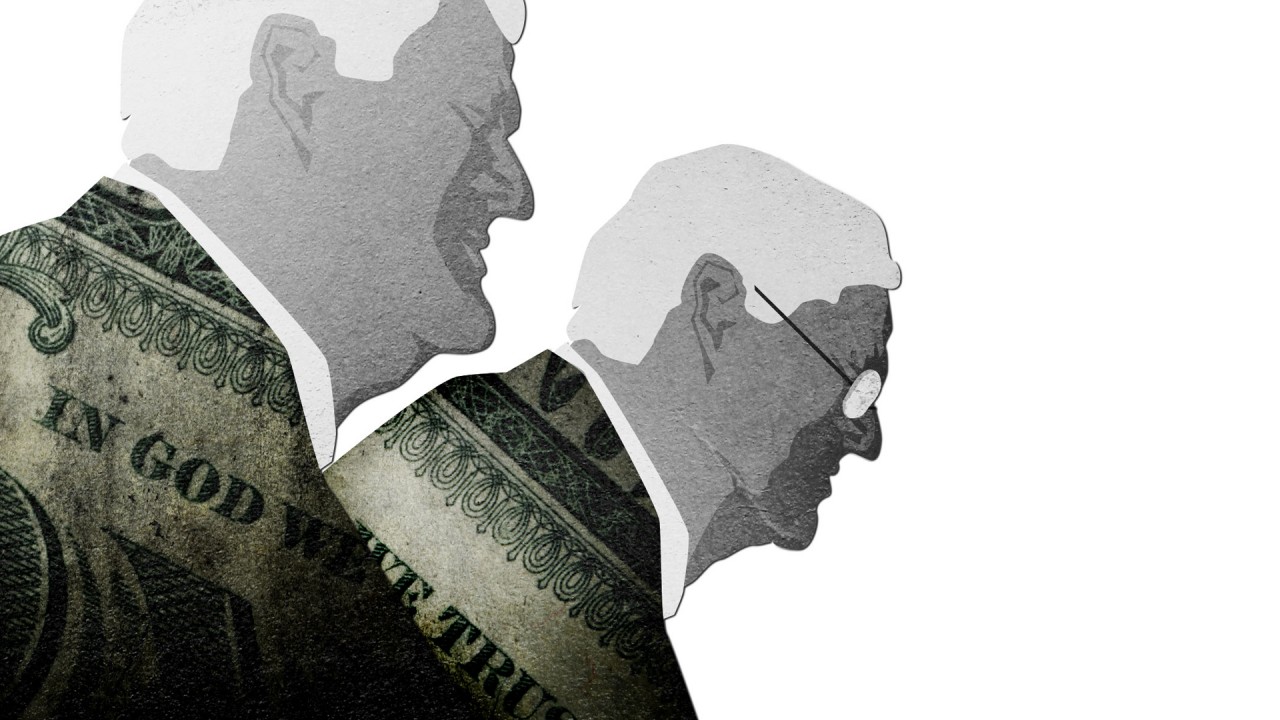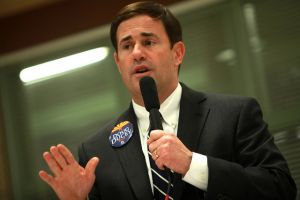
(Image: Jared Rodriguez/Truthout/Flickr cc 2.0)
This post originally appeared at The American Prospect.
Arizona’s Republican-controlled legislature voted Tuesday to dismantle the state’s strict campaign-finance disclosure rules, a move critics say will unleash a flood of undisclosed political spending in an election already increasingly dominated by “dark” money.
The fight over the Arizona bill, which could be signed into law as early as this week, has pitted good government activists against deep-pocketed corporate donors and political groups underwritten by the billionaire industrialists Charles and David Koch. It also spotlights a growing national debate over secret political spending, which is on pace to hit record levels in 2016.
Federal enforcement agencies, most notably the Internal Revenue Service and the Federal Election Commission, have done virtually nothing to police politically active tax-exempt groups that operate outside the disclosure rules. That’s prompted some states, including California, Montana and Delaware, to pursue tougher political disclosure rules on their own.
Arizona, however, is headed in the opposite direction. The state has fought over its political money rules since 1998, when voters approved a sweeping Citizens Clean Elections Act that combines public financing with full disclosure for campaign contributions. The law survived a Supreme Court challenge and at least one legislative attempt to dismantle it.
Now Republican legislators have taken direct aim at the state’s transparency laws, passing a bill — SB 1516 — that will take the enforcement of the state’s disclosure rules out of the hands of its Citizens Clean Elections Commission, and hand it over to the Internal Revenue Service. Under fire on Capitol Hill for targeting tea party groups, the IRS has essentially stopped policing politically active tax-exempt groups.
— Robert Maguire, Center for Responsive Politics
“If the folks who wrote SB 1516 intended for it to actually result in effective oversight of politically active nonprofits, they wouldn’t have relied so heavily on the IRS,” says Robert Maguire, who investigates political nonprofits for the nonpartisan Center for Responsive Politics. “The IRS is about as good at effective, timely oversight of politically active nonprofits as a sea cucumber is at chess.”
Federal agency enforcement lags far behind elections, explains Maguire, meaning that even when agencies do go after secret spenders, the candidates who had benefited have often already finished at least one term in office. But lately the IRS has essentially signaled that anything goes, granting favorable tax-exempt status to even such blatantly political groups as Crossroads GPS, masterminded by GOP operative Karl Rove, and a conservative Arizona group known as Americans for Responsible Leadership.
“Arizona is essentially looking at how low the bar is set at the federal level and trying to emulate that, rather than improving on that where it can,” Maguire says.
Many of the Arizona officials now pushing the legislation swept into statewide office in 2014 on a wave of undisclosed spending, including the governor, the attorney general and the secretary of state. They benefited from tens of millions in spending by “dark” money groups associated with the Koch brothers’ network of conservative donors.
The bill reflects, in part, growing GOP frustration with the Citizens Clean Elections Commission, the state regulatory body created by the clean elections law in 1998. In 2014, the commission levied a $95,000 fine against a free-market oriented political nonprofit group, the Legacy Foundation Action Fund, for failing to disclose its donors. Last summer, the commission also approved new rules that would force social welfare groups that met a certain threshold of political spending — $500 over a two-year cycle — to file as political committees and disclose their donors.
Both moves prompted Secretary of State Michele Reagan to intervene. Reagan is at the center of Arizona’s effort to restructure its campaign-finance regulations. Her own position on disclosure has changed during her career in public office. As a state legislator back in 2013, Reagan crafted legislation that would have required 501(c)(4) “social welfare” groups to disclose their donors, even though federal tax code doesn’t require such reporting. She even campaigned for secretary of state on a promise to use that position to shine a light on dark money.
But once in office, Reagan changed her tune. It probably didn’t hurt that she beat her Democratic opponent, former state attorney general Terry Goddard, with the help of a last-minute $300,000 attack-ad blitz paid for by a tax-exempt conservative group known as the 60 Plus Association, that portrayed Goddard as soft on immigration.
Reports later showed that the group had received money from American Encore, one of the secretive groups in the Koch brothers’ political network. Koch-funded groups groups also spent heavily to help elect now-Governor Doug Ducey and Attorney General Mark Brnovich, both supporters of the new bill to dismantle state campaign-finance and disclosure rules.

Arizona Governor Doug Ducey (Credit: Gage Skidmore / Flickr)
Reagan now says enforcing political disclosure rules is too difficult for the state: “The worst thing you can do is tell people something that they want to hear, knowing it can’t be done,” Reagan said last year. “Yes, I tried. I ran a bill and in running the bill, I learned what can happen on the state level and the state legislature regarding disclosure of these groups and what can’t happen.”
Reagan maintains that only her office — not the state’s Clean Elections Commission — has the authority to regulate independent political spending. She has tapped her lieutenant, state elections director Eric Spencer, to help block the commission from enforcing its transparency rules. Spencer is widely seen as the mastermind behind the legislation to roll back campaign-finance regulations. Spencer previously worked as an election law attorney at the law firm Snell & Wilmer, which has ties to Arizona Governor Doug Ducey and has argued cases calling for deregulation of campaign-finance laws. He argues that campaign-finance enforcement cannot happen on two tracks.
“A democracy cannot function when it is in a polygamous relationship,” Spencer said, contending that the commission is creating a two-track system for regulating campaign finance. If the commission stayed the course, they “bought [themselves] a lawsuit,” he said.
Spencer said in a hearing before the legislature’s elections committee that the bill sets out to “fundamentally reimagine the way that we look at the law here.” He argues the bill would simplify the language of current campaign-finance law and streamline it in a way that makes it user friendly, uniform and consistent.
The bill “undertook the important task of trying to balance on one hand transparency, which is always important, but also protecting free expression,” Spencer said at the hearing. “Those are often in tension with each other and I think we struck the right balance.”
Conservative groups, which have long opposed the state’s Clean Elections Act, have rallied behind the bill. Most notably, it won the endorsement of Americans for Prosperity, one of the biggest-spending groups in the Koch brothers’ orbit. Conservatives argue that the disclosure requirements chill their free speech rights.
But critics warn the legislation will skew the election in favor of dark-money groups.The bill would make it impossible for state officials to regulate dark-money spending by imposing tax-exempt rules on political players, says Thomas Collins, director of the Clean Elections Commission—a drastic change in Arizona law.
“If you’re a 501(c)(4) it gives you even more certainty that as long as IRS doesn’t do anything, nobody in the state will do anything to you,” Collins says. “It supersedes the commission’s authority and places the IRS between the commission and making the determination of what a political group is.”
Democrats also complain that the legislation has slid through a greased track in the statehouse, though Spencer did hold public stakeholder meetings. When Democratic legislators tried to add amendments that Reagan had previously supported in 2013, Republicans blocked them. And when Democrats pressed Spencer to show them the final language of the bill before it was brought to a vote, he refused, saying Democrats’ partisan attacks against the bill foreclosed that opportunity.
The bill was passed earlier this month by the state senate and on Tuesday by the house. It now goes to Governor Ducey’s desk, where it will almost certainly be signed.
Arizona Senator Steve Farley, a Tucson Democrat who prominently backed Reagan’s disclosure bill several years ago, says it’s impossible to overstate the potential impact of the campaign-finance rewrite.
“It’s all to keep the [Republican] majority in place,” Farley complains. “The way dark money works is when you throw angry ads on TV, then that creates an ugly climate. It depresses [youth] turnout and increases conservative turnout.”




